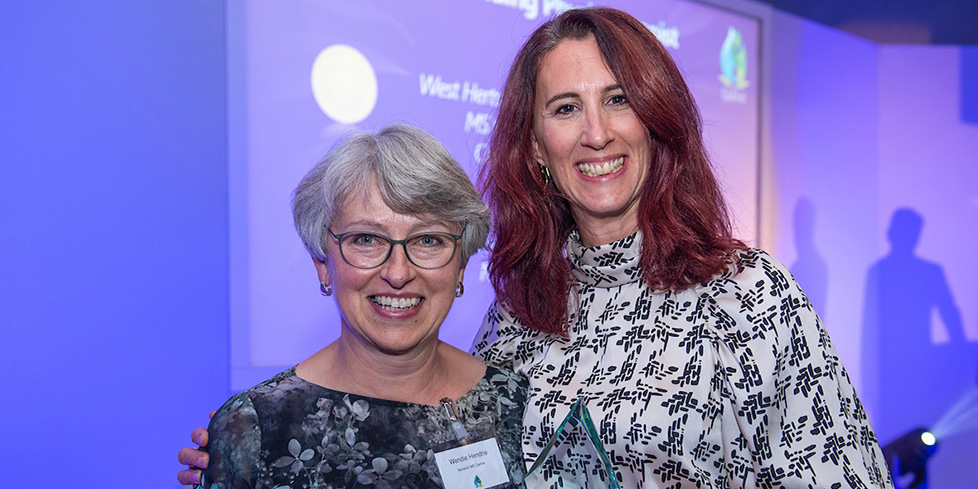One Stop Shops provide person-centred community care in Hertfordshire
Getting to know each patient – and working as a team – are key to supporting people to live well with MS.
That’s according to QuDoS Outstanding MS Physiotherapist, Jody Barber, who describes herself as a hands-on clinician with a tendency to root for the underdog.
Jody, a Specialist Neurological Physiotherapist at West Hertfordshire Community Neurological Service, said: “When I first started working in MS there weren’t any treatments and people were a lot more disabled compared to the kind of people I see now.
“There was, especially at that time, a lot you could do to significantly enhance someone’s quality of life.”
Jody, who has worked in Hertfordshire for around 20 years, has seen the difference the advent of disease modifying drugs (DMD) has made to the needs of her caseload, and adapted her service accordingly.
“I have grown up with my clients, our families have grown up alongside each other and I’ve seen the issues that people face change. When I started, people were living with a lot more disability, compared to what we see now.
“People who have been fortunate enough to be on a DMD live with symptoms and have problems that might come and go, but on the whole, they are working and getting on with life. But as they approach older age, they have to learn how to cope with an aging body that has disability.”
Engage and empower
Getting to know each individual and how their primary impairment impacts on secondary complications, is crucial to “keeping people on their feet”, she went on.
To that end, Jody runs joint clinics, or “One Stop Shops”, with MS specialist nurses, offering open-ended, motivational interviewing-based consultations that can take up to 90 mins.
The sessions, which started in 2017, are offered to people finding it difficult to engage in at least one element of their care for any number of reasons.
“Of course, they take much longer than the average appointment, and there is a cost attached to having two professionals spend 90 minutes with someone. But we have some great successes with this way of working.
“It’s about really getting to the person in front of you so you can help them to engage. We want to understand the challenges people have and how we can work with them to overcome them.”
Inspired by the MS Trust’s Advanced MS Champion project, the One Stop Shop concept is now being extended, in the form of a “triage clinic”, to people with advanced disease.
The team, which has received additional training, have developed a simple template that lists the MS Trust’s advanced disease domains, asks if the person has additional needs and, if so, how they are being managed.
“It’s a simple form that helps us to identify people who may need extra support, helps us to understand where the additional needs are, and who in the team that person needs to speak to,” explained Jody.
“It’s very much a work in progress, but it helps us to navigate the kind of care each person might need.”
Upskilling for quick wins
The One Stop Shops have also informed the team’s vestibular pathway.
After seeing how many patents at the joint clinic experienced signs of vestibular dysfunction, Jody trained MS nurses to spot the common symptom, and arranged for them to refer directly into the Trust’s neuro-vestibular service.
“The quicker someone with vestibular dysfunction is seen, the better, and this new way of working has really streamlined our service,” she explained.
“It’s a quick win, because a large proportion of people with MS are experiencing this and dealing with it can have a huge impact on quality of life.”
All the services she and her team provide have a common theme: getting to know patients and individuals and understanding human nature.
“You need to have that level of compassion and understand that, with the best will in the world, we all find it difficult to take up new exercise programmes,” she said.
“It’s so much harder when you have to exercise because you have a condition that you didn’t ask for and that has no cure. We need to understand that it is really hard to keep going and support them.”
Building skills
She admits that in her junior physio years, she may have floundered with the complexity of many of the advanced MS cases she sees today.
But the more experience and skills you have in your toolkit, the more you can help, she said, adding that was why it was so important to share best practice.
“Of course, it is a challenge, because you don’t have everything you need in terms of staffing and resources, and a lot of the symptoms are invisible – but it’s a challenge I am always excited to rise to.”
